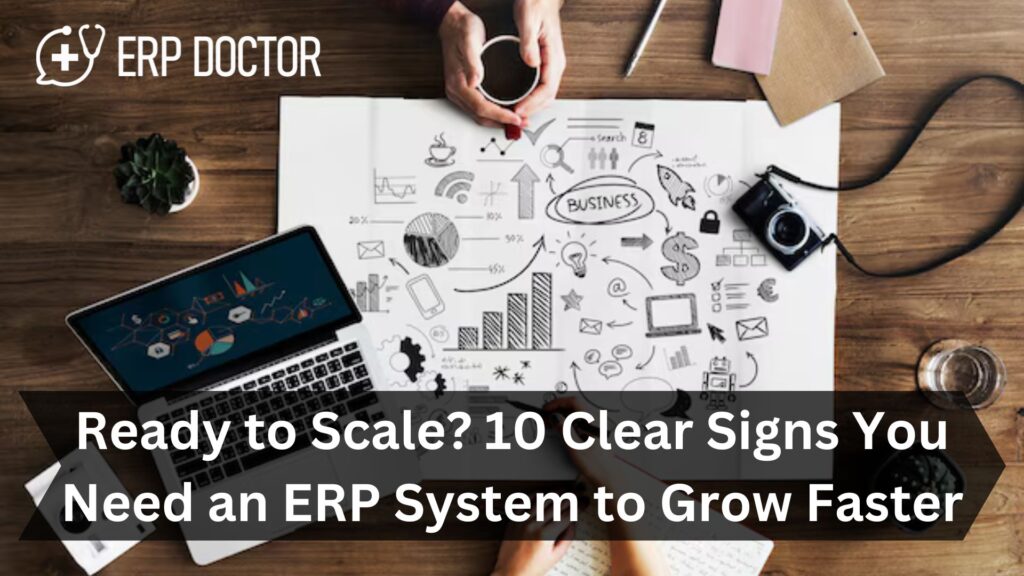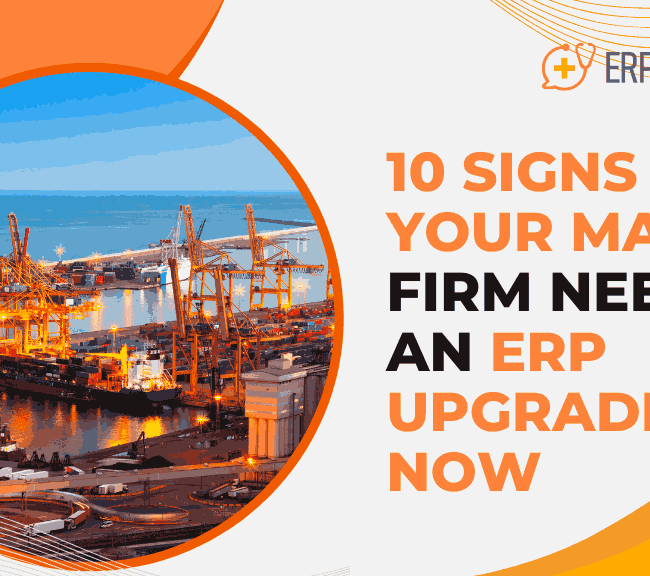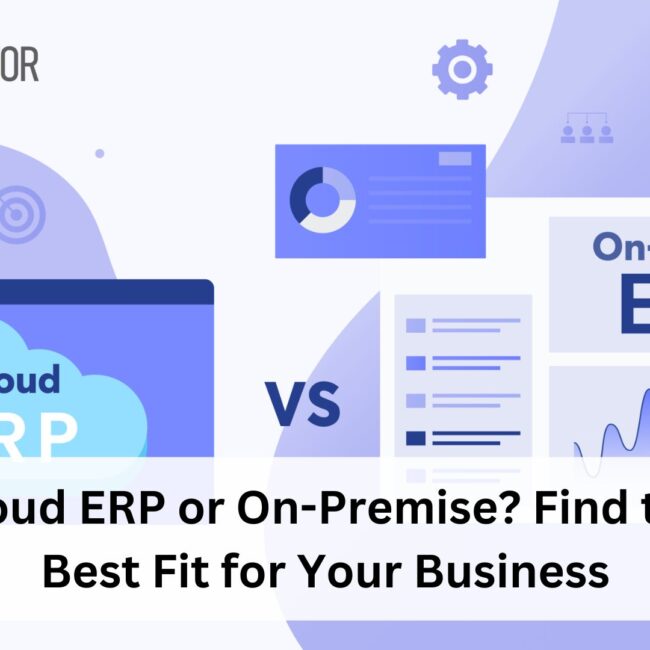10 Clear Signs That You Need an ERP System to Grow Faster

Are You Drowning in Business Challenges? It’s Time for an ERP Solution!
Are your customers frustrated with delayed shipments? Is your production team constantly battling shortages? Are your suppliers pressuring you for overdue payments? And is there internal conflict brewing within your departments? If this sounds all too familiar, you’re not alone. Many business owners face these challenges, and more often than not, they stem from operational inefficiencies that drain productivity, profit, and employee morale. Meanwhile, you may be watching your competitors thrive, seemingly having it all together while you’re left managing the chaos. But what if I told you this doesn’t have to be the case? The good news is that it can be avoided. With the right solutions — like ERP — your business can streamline operations, eliminate inefficiencies, and start grow. Let me show you how.
The Root of the Problem: Operational Inefficiencies
Hello and welcome! If you’re new to the channel, I’m Raman, CEO of ERP Dr. Over the past 15 years, I’ve helped over 1,000 companies from various industries streamline their operations and achieve exponential growth by implementing ERP systems. If there’s one thing I’ve learned during my career, it’s that businesses experiencing rapid growth tend to ignore the signs of operational inefficiencies until they’ve spiraled out of control.
In today’s post, I’ll highlight the top 10 signs that scream “It’s time for an ERP!” These issues may be holding your business back, and without an ERP system, you’re missing out on growth opportunities and significant efficiency gains.
Let’s dive in!
1. Disconnected Systems and Data Silos
If your sales, production, stores, quality, and finance departments are using different software that doesn’t communicate with each other, you’re bound to run into inefficiencies. Imagine the headache of having a sales team that can’t see real-time inventory data or a production team that doesn’t know about quality control issues until it’s too late.
When systems are disconnected, it leads to data silos. This means you’re wasting time reconciling data rather than using it to make important business decisions.
An ERP system connects all departments under one roof, ensuring seamless data flow and eliminating these silos. It’s like a relay race — each department hands off information to the next, ensuring everyone is on the same page.
2. Manual and Time-Consuming Processes
Still entering data manually or using spreadsheets for approvals and interdepartmental communication? These outdated practices not only waste time but also increase the risk of human error.
An ERP system automates routine processes such as data entry, invoicing, and inventory management. This automation not only saves your team valuable time but also reduces costly mistakes.
If your business is still relying on manual processes, it’s a clear sign you’re lagging behind.
3. Inaccurate or Delayed Financial Data
Struggling to close your books at the end of the month? If your finance team is scrambling to generate reports or if you’re not getting real-time financial insights when you need them, your business is flying blind.
With an ERP system, you gain real-time, accurate financial data, so you always know where your business stands. No more guesswork. Your finance team will be able to close books faster, and you’ll be able to make decisions based on up-to-date, reliable data.
4. Lack of Business Insights and Reporting
As a key decision-maker, are you often waiting for reports to be manually created in Excel or not receiving real-time performance data? This delay in information can make your company reactive, rather than proactive.
With a robust ERP, you’ll have access to real-time dashboards and automated reports, enabling you to make quick, informed decisions based on live data.
If you’re still relying on outdated or incomplete reports, an ERP could be your solution to better visibility and decision-making.
5. Inventory Management Issues
If your production or delivery teams are constantly facing shortages, or if you’re holding excess inventory that’s tying up your capital, it’s a clear sign your inventory management system needs improvement.
A powerful ERP system provides precise inventory tracking, automated reordering, and better planning across multiple locations. This will help you maintain optimal stock levels, reduce shortages, and eliminate excess inventory.
6. Inability to Meet Customer Expectations
Delayed shipments, late deliveries, poor product quality, and unsatisfied customers are all signs your business operations are falling short. As a company grows, delivering personalized customer service can become challenging. However, poor communication and slow responses can frustrate customers and harm your brand reputation.
An ERP system improves communication across departments and enhances customer service by providing real-time information and streamlined workflows. When all departments are aligned, you’ll meet your customers’ expectations more consistently.
7. Limited Visibility Across the Business
Lack of visibility into your business operations is a major issue, especially for business owners, CEO, or directors. If you’re depending on others to generate reports for you or if you’re struggling to get a clear picture of what’s happening across departments, you’re missing out on opportunities for improvement.
An ERP system provides you with comprehensive, real-time data and reports, offering a holistic view of your business. You’ll be able to identify bottlenecks and areas for growth, making you more proactive in your decision-making.
8. Trouble Managing Multi-Currency or Multi-Language Transactions
If your business operates internationally, handling multiple currencies, languages, or local tax regulations can become complex. Managing these factors manually is error-prone and time-consuming.
A modern ERP system can centralize operations, automate transactions, and handle multi-currency and multi-language requirements with ease. This is crucial for businesses that want to scale globally.
9. Employee Frustration and High Turnover
Employee dissatisfaction often stems from inefficiencies that slow down their work. If employees are frustrated by manual processes or outdated systems, it leads to burnout, low morale, and potentially high turnover.
Implementing an ERP system can improve employee productivity, reduce frustrations, and create a more streamlined, enjoyable work environment for your team.
10. Scaling Challenges
Is your business struggling to scale due to operational bottlenecks? As your company grows, managing complexity without the right systems becomes increasingly difficult.
An ERP system supports growth by providing scalable solutions for inventory management, financial tracking, customer relationship management, and more. It grows with your business, ensuring you’re always prepared for the next phase of expansion.
Time to Take Action
If any of these signs resonate with you, it’s time to seriously consider implementing an ERP system. Businesses experiencing rapid growth or dealing with operational chaos can’t afford to wait. The right ERP solution can streamline your operations, improve decision-making, enhance customer service, and drive significant growth.
Ready to stop the chaos and start thriving? Let’s talk about how an ERP can transform your business!
If you would like to know more about our ERP services, please visit us at: https://erpdoctor.in/
Want to speak to an expert? Fill in the form below, and we will be in touch with you shortly!







